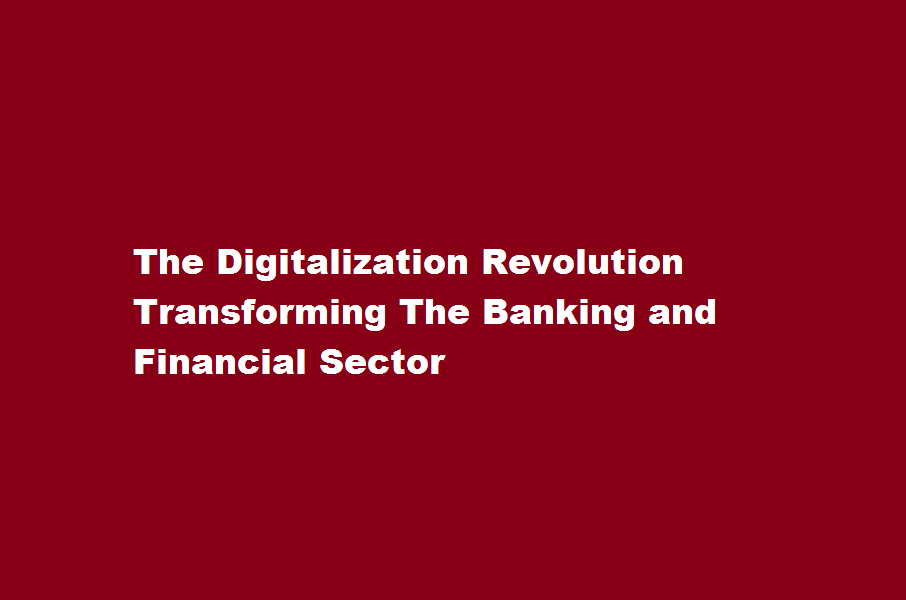The Digitalization Revolution Transforming The Banking and Financial Sector
4 min read
Introduction
Digitalization has brought about a paradigm shift in the banking and financial sector, transforming the way financial services are delivered, accessed, and experienced. From the rise of online banking to the emergence of financial technologies, digitalization has revolutionized traditional banking processes, enhanced customer experiences, and spurred financial inclusion. This article delves into the profound impact of digitalization on the banking and financial sector, highlighting key changes and innovative technologies driving the industry forward.
Rise of Online and Mobile Banking
Digitalization has enabled the rise of online and mobile banking, empowering customers to conveniently access their accounts, conduct transactions, and manage their finances anytime and anywhere. With secure online portals and mobile applications, customers can check balances, transfer funds, pay bills, and even apply for loans or credit cards with ease. Online and mobile banking have simplified banking processes, reduced wait times, and provided customers with greater control over their finances.
Digital Payments and Mobile Wallets
Digitalization has revolutionized the way payments are made, with the advent of digital wallets and contactless payment options. Mobile payment platforms like Apple Pay, Google Pay, and Samsung Pay allow users to make secure payments using their smartphones or smartwatches. This shift towards digital payments has not only increased convenience for consumers but has also opened up new opportunities for businesses, enabling faster and more efficient transactions.
Financial Technologies (FinTech)
Digitalization has paved the way for the rise of financial technologies (FinTech), which are reshaping the banking and financial landscape. FinTech encompasses a wide range of innovations, including peer-to-peer lending, robo-advisors, blockchain technology, and cryptocurrencies. These technologies have introduced new business models, improved operational efficiency, enhanced risk management, and increased accessibility to financial services for underserved populations.
Enhanced Customer Experience
Digitalization has significantly enhanced the customer experience in the banking and financial sector. Customers now have access to personalized financial insights, tailored product recommendations, and real-time notifications about their accounts. Chatbots and virtual assistants provide instant support, answering customer queries and resolving issues promptly. The availability of self-service options and intuitive user interfaces has made banking more user-friendly and efficient, leading to higher customer satisfaction.
Big Data and Analytics
Digitalization has enabled the collection and analysis of vast amounts of data, providing valuable insights for banks and financial institutions. Big data analytics help financial institutions identify patterns, detect fraud, assess risk, and personalize customer experiences. Advanced analytics enable more accurate credit scoring, fraud detection, and investment recommendations. By harnessing the power of data, financial institutions can make data-driven decisions, enhance operational efficiency, and offer tailored financial products and services.
Financial Inclusion and Access to Banking Services
Digitalization has played a crucial role in promoting financial inclusion by providing access to banking services for previously underserved populations. Mobile banking, digital wallets, and FinTech solutions have allowed individuals in remote areas or with limited access to physical branches to engage in financial transactions, receive loans, and save money securely. Digitalization has bridged the gap between the unbanked and the formal banking system, fostering economic growth and empowerment.
Frequently Asked Questions
How has digitalization improved security in the banking sector?
Digitalization has improved security in the banking sector through the implementation of robust authentication protocols, encryption technologies, and advanced fraud detection systems. Additionally, biometric authentication methods, such as fingerprint or facial recognition, provide an extra layer of security for online and mobile banking transactions.
What are the benefits of using mobile wallets and digital payments?
Mobile wallets and digital payments offer convenience, speed, and security. Users can store multiple payment methods in one digital wallet, eliminating the need to carry physical cards. Digital payments enable quick and contactless transactions, reducing the risk of theft or loss. Furthermore, digital payment records provide better financial tracking and budget management.
How are FinTech innovations reshaping the banking industry?
FinTech innovations are reshaping the banking industry by introducing new financial services, streamlining processes, and improving accessibility. Peer-to-peer lending platforms connect borrowers directly with lenders, bypassing traditional intermediaries. Robo-advisors provide automated investment advice based on user preferences. Blockchain technology ensures secure and transparent transactions. These innovations are driving efficiency, reducing costs, and transforming traditional banking practices.
What role does digitalization play in promoting financial literacy?
Digitalization plays a significant role in promoting financial literacy by providing access to educational resources, interactive tools, and personalized financial insights. Online platforms and mobile apps offer financial literacy courses, budgeting tools, and investment simulators, empowering individuals to make informed financial decisions and improve their financial well-being.
Conclusion
Digitalization has revolutionized the banking and financial sector, transforming how financial services are accessed, delivered, and experienced. From the rise of online and mobile banking to the emergence of FinTech innovations, digitalization has improved customer experiences, increased accessibility to financial services, and fostered financial inclusion. As technology continues to advance, embracing digitalization will be essential for banks and financial institutions to stay competitive, meet evolving customer expectations, and drive innovation in the rapidly changing financial landscape.
Read Also : The Digitalization Revolution Impact on Traditional Media and Entertainment Industries






